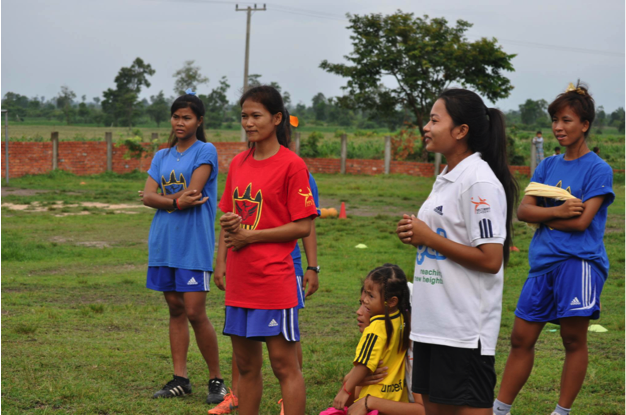Consider
At SALT Academy (Cambodia), adolescent girls are chosen from surrounding communities to become Mighty Girls and are given access to education and professional football training in Battambang. The young girls not chosen as Mighty Girls initially felt discouraged from playing; however, SALT organized weekly leagues for these girls as well as events and summer school programmes to keep them engaged. Those chosen as Mighty Girls coach teams in each community and organise the various events and summer programmes.
When considering building solid partnerships, first consider your relationship with the girls who will be your participants as well as with the rest of the girls in the community. Gaining buy-in from girls can be the most difficult part of building a programme, as many girls have never considered sport as something available to them or something that they necessarily wanted to do because of social pressure to be ‘feminine’ and do things that are ‘appropriate’ for girls.
Additionally, girls influence each other. If sport participation is new, girls can be a negative influence on each other and stand in the way of other girls participating. This can take the form of teasing girls who wear sport clothes and making them feel bullied. It is essential that girls are informed about the sport programme and that you make an effort to dispel misconceptions about playing sport. It is also important that if your programme has limits to the number of participants you can have, that you take steps to avoid potential conflict with girls who do not participate and who may be jealous of the resources that their peers are receiving. Whether participation in your programme is based on age, living location, or something else, you should take steps to make this clear to all stakeholders in the community, especially the girls who are not participants.
Common Barriers to Engaging Peers
- No access to peers of the girls in your programme
- Jealousy of girls who participate in the programme and get equipment and other resources
- Misconception that playing sport makes you masculine and/or less feminine
Incentives or Motivations for Engagement
- Girls have a stronger network of peers outside of their sport group that encourages them to play and be a leader on and off the field.
- Engaging peers of the girls in your programme could turn those peers into potential new participants in the future
- Girls in the programme have an easier time passing along information learned from the sport and life skill trainings to their peers and, therefore, more girls are reached indirectly in the community.
- The community does not only see sport as an activity for a select group of girls but rather, something that all girls in the community can do and have the right to do.
Strategies for Engagement
- Hold community events that are open to all girls in the community, regardless of whether they are part of the programme or not.
- During these events, expose the participants and their peers to general sports and play-based activities.
- These events are great opportunities to celebrate different international holidays, like International Day of the Girl Child.
- Encourage participants in the programme to reach out to a certain number of their friends at school who are not part of the programme each month or every couple of months.
- This could be in the form of informal discussion about things they learned during trainings or life skill courses or more formal peer education lessons supported by the organisation.
- Hold a ‘bring a friend to training’ day, when each participant in the programme can bring a friend to one training session so she can see and understand what her friend, who is a participant in the programme, is experiencing.
How It Works
India
At the Naz Foundation, girls not only attend the Goal programme for sport and life skills, but also have the opportunity to become coaches for the organisation. Taking on these leadership roles, the young women coaches of Naz are able to reach so many more girls in their communities and teach them sport and important life skills, breaking down prejudices and misinformation.
Nigeria
In addition to their classroom and football training sessions, Youth Empowerment Foundation uses a peer-to-peer model where girls who participate in their programme go out and educate other girls about what they learn from Youth Empowerment Foundation coaches and educators. This model has allowed them to exponentially increase their influence, and it creates community support from other girls who become interested in the programme through peer-to-peer interactions.
Cambodia
The SALT Academy uses football festivals to attract and expose adolescent girls across the countryside to football. Mighty Girls, SALT football players, run the festivals and give inspirational talks about what football and sport has done for their own lives. One example is from the Buor District, a very small community near the Thai border, which used to be littered with landmines. There were 90 girls who participated with numerous young boys looking on. The life skill sessions were on gender equality and children’s rights. At the end three Mighty Girls from the community shared how football has positively impacted their lives and the obstacles they faced as younger female football players.


Caption: Mighty Girls from Salt Academy host football festival in rural areas of Cambodia.